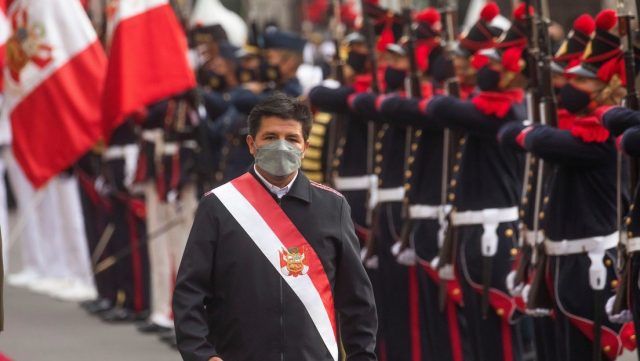The endless political crisis in Peru adds a new actor with the arrival in Lima of a mission from the Organization of American States (OAS) that has proposed itself to de-escalate the turbulence that has plagued Pedro Castillo since he came to power.
The president is the first to meet with the mission. According to Castillo, the purpose of the visit is for the High-Level Group to learn «what is happening in Peru and how some sectors want to endanger the country’s democracy and stability», he wrote on his social networks, reports RT.
The delegation plans to meet with the head of Congress, José Williams, and the president of the Judiciary, Elvia Barrios, with the aim of hearing the story – according to these protagonists – of a relentless conflict.
The mission’s presence comes a month after the Peruvian government activated the Inter-American Democratic Charter, a mechanism whose goal is to ensure democracy in situations of political instability.
After its visit to the country, the group will prepare a report on the situation, which will be presented to the OAS Permanent Council for evaluation.Is Peru’s democracy in danger?
The day before, various opposition organizations staged a march to request the resignation of Castillo, who has several investigations open for alleged acts of corruption, such as influence peddling and aggravated collusion.
But the president considers that the cases against him are a legal argument to remove him from power «with lies» and to «hit a governmental management focused on working for progress and equality for all».
However, in statements to local media, the president of the Judiciary considered that her meeting with the mission will allow her to demonstrate that in Peru «judges act independently and each one of them responds to the requirements of the Public Ministry», therefore there is no «political persecution», as Castillo has denounced.
On Sunday, Barrios called the mission’s visit unnecessary. «But it’s good that they are here and the interview is going to be fruitful», said the magistrate, after giving a boost to the Nation’s prosecutor, Patricia Benavides, who Castillo has directly denounced. “I stand in solidarity against any act that fights corruption. I’m saying it straight», she asserted.
According to the program of the visit that has been broadcasted by various media, the OAS group also plans to meet this afternoon with Benavides, who has several investigations against the president and those around him.An uphill struggle
Over the weekend, former Paraguayan foreign minister and spokesman for the mission, Eladio Loizaga, clarified that the mission will undertake «steps to promote dialogue and strengthen the democratic system of government», although he acknowledged that it will not be possible to «listen to everyone».
In his brief message, broadcasted on the OAS social networks, the diplomat assured that the members of the mission are «extremely committed» to the task. «We know that our visit has raised great expectations in Peru, that any gesture we make or any word we say, there will be those who interpret it as a position taken by the group, in one way or another. Nothing is further from this reality», he pointed out.
The words of the former foreign minister are more than a protocol greeting, since the OAS precedent is not very flattering. In 2019, when a mission was convened to address the political crisis in Bolivia, the report prepared was strongly questioned and ended up being an incentive for the coup against Evo Morales.
After the document was published, the country’s Armed Forces used it to justify the rupture of the constitutional order, giving an endorsement to the de facto government of Jeanine Áñez, and perpetrating a wave of repression that left the balance of the Sacaba and Senkata massacres.
Since then, the OAS has suffered a crisis of credibility, fueled by the actions of its secretary general, Luis Almagro, who is currently being investigated by the organization itself for the alleged relationship he had with a subordinate. Last June, Argentine President Alberto Fernández insisted that the organization required a restructuring if it wanted to be «respected and return to being the regional political platform for which it was created».
Now, with the mission deployed in Peru, the multilateral organization will have the opportunity to demonstrate how urgent –or not– the need to refresh its structures is. Similarly, in light of what happened in Bolivia, it will be its ‘strongest test’ to see if it is capable of resolving a conflict instead of adding more fuel to the fire.


